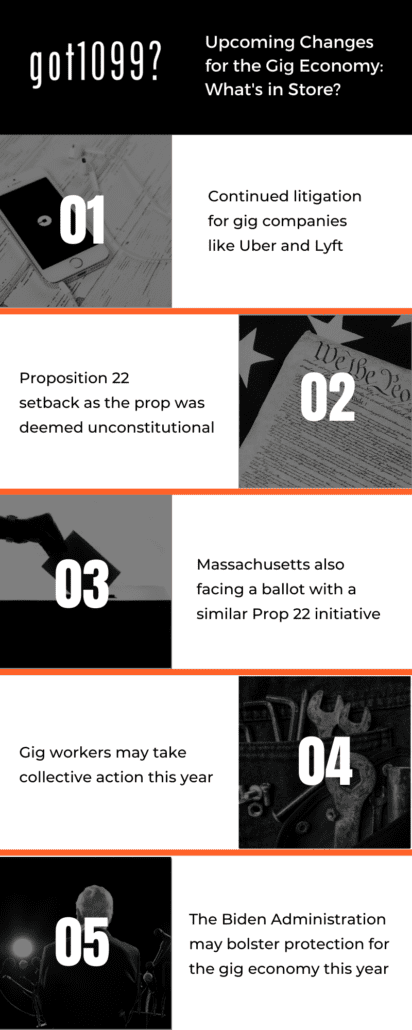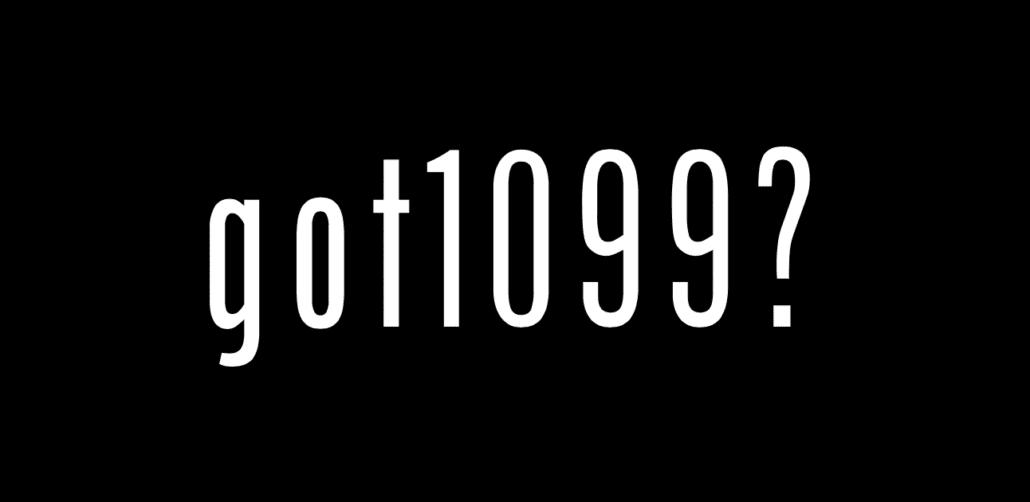Independent contractors, also known as gig workers, work on a contractual basis for a specific job. This is becoming a highly desirable form of employment for individuals as well as for businesses looking to hire contractors to complete tasks outside of their typical scopes of work.
1099 independent contractors are self-employed, create their own hours, use their own equipment, are paid a set rate, and do not have payroll taxes deducted from their payment—which saves employers money.
Classifying independent contractors used to have less clear regulations from the 13- Factor Borello test. However, after the Dynamex case, where a company turned their W-2 employees into 1099 workers to save money on employee benefits and payroll taxes, the government implemented Assembly Bill 5 (AB-5) to make the rules more clear.
Now, employers can only hire independent contractors and classify them as such if they meet all three criteria of the ABC test.
The new criteria created tension for the rideshare space for companies like Uber, Lyft, and Doordash. Proposition 22 rose in California to sidestep the ABC test and allow rideshare workers to be classified as independent contractors instead of employees.
As independent contractors, these drivers would not be privy to:
- Overtime
- Paid sick leave
- Health care
They would, however, have the flexibility to work a schedule they wanted. The California supreme court ruled Prop 22 unconstitutional. Learn more about what Prop 22 could mean for your business here.
This year seems to be another eventful year for the gig economy, as we’re seeing:
- Continued litigation for gig work companies
- Prop 22 in California
- Similar propositions in Massachusetts
- Gig organizers
- Federal guidance
- And more
Keep reading for Bloomberg Law’s full article on how gig economy companies must brace themselves for a crucial year as challenges arise.
The gig economy faces yet another year of upheaval as the Biden administration eyes actions to address worker rights, court battles continue to play out across the country, and more states confront ongoing disputes about drivers’ employment status.
App-based giants, including Uber Technologies Inc., Lyft Inc., and DoorDash Inc., ended 2021 still locked in fierce litigation and lobbying to defend their business models, which rely on independent contractors who don’t receive the same job protections and benefits as employees.
That jockeying will continue this year as their drivers, deemed essential workers during the Covid-19 pandemic, push for more rights through court action and organizing efforts around the country.
“At the beginning of the pandemic many of us wondered if it was the death knell for Uber and Lyft. If their business model were to fail, what would that mean for app-based gig work?” said Tia Koonse, the legal and policy research manager at the University of California, Los Angeles Labor Center. “It’s looking like it’s a model that’s here to stay.”
Massachusetts is set to be the next political battleground, with a potential ballot initiative this fall that would mirror California’s Proposition 22 to allow some gig companies to classify their drivers as contractors.
At the federal level, agencies such as the U.S. Labor Department, the National Labor Relations Board, and the Federal Trade Commission aim to join the worker misclassification fray.
Meanwhile, the U.S. Supreme Court will hear two cases this year that could affect arguments used by gig workers to circumvent arbitration agreements they signed to keep their claims in courts.
Amid these ongoing challenges, the gig companies point to surveys that show their workers want the flexibility that comes with contractor status. Theane Evangelis, an attorney with Gibson, Dunn & Crutcher LLP in Los Angeles who represents several major gig companies in employment disputes, said these workers also deserve more protections.
“The answer is to provide new benefits while ensuring they keep the flexibility they value,” Evangelis said.
Litigation Persists
In 2021, gig companies such as Uber and Lyft won federal appeals court cases that said drivers must arbitrate their federal claims for minimum wages, overtime, and paid sick leave.
The courts found that the drivers didn’t qualify as interstate transportation workers exempt from the Federal Arbitration Act—an issue the Supreme Court will soon address in a case involving a Southwest Airlines Co. cargo ramp supervisor.
The high court will separately decide if workers in California can bypass arbitration through the Private Attorneys General Act, a unique law that lets them sue employers on behalf of the state. A decision in that wage-hour dispute between Viking River Cruises Inc. and a former sales representative could affect California gig workers who have sued over worker misclassification via PAGA.
PAGA claims will be an avenue for California workers trying to challenge gig companies in 2022, said Michael Brewer, a managing partner at Baker McKenzie in San Francisco.
Prop. 22 Setback
Gig companies also have experienced court setbacks that will reverberate into the year. In California, a state judge ruled that the $200 million voter initiative known as Prop. 22 was unconstitutional. California will defend the ballot measure in a state appellate court in 2022.
Uber, Lyft, and others that bankrolled Prop. 22 also face a mountain of litigation from before the rule went into effect. Meanwhile, app-based companies like Handy Technologies Inc., which fell outside of the initiative’s scope, also continue to defend worker misclassification lawsuits.
For some companies, their entire business model hinges on what a single judge in a single court decides in a case, Brewer said.
“I don’t know that we’ll get a definitive ruling that allows companies to either change their business model, go out of business, move out of California, or breathe a sigh of relief,” he said.
Meanwhile, Uber and Lyft also face hundreds of state court lawsuits filed by Jane Doe plaintiffs who say they were sexually assaulted by drivers. These cases have the potential to put the rideshare companies on the hook for damages and to bolster safety requirements. Lyft’s cases are scheduled for bellwether trials in May 2022, while Uber’s coordinated cases move forward.
Massachusetts Battleground
Uber and Lyft are also defending a misclassification lawsuit from the attorney general of Massachusetts, which has a rigid worker classification law similar to California’s.
The companies are now backing a Prop. 22-like ballot initiative for the fall. The group pushing for the measure has submitted 100,000 certified signatures to the state’s secretary of the commonwealth, and paid political ads began airing in December.
The ballot question is expected to be introduced to the state legislature for consideration in early 2022. Like in California, the measure would cement app-based gig drivers as independent contractors who can receive some job benefits like minimum earnings, accident insurance, and a healthcare stipend.
Gig Organizers
Collective action among gig workers may be on the rise in 2022, said Margaret O’Mara, a professor who studies the tech industry at the University of Washington. She pointed to New York City food delivery workers, led by Los Deliveristas Unidos, who successfully lobbied city leaders for better wages and bathroom access rights through a grassroots campaign.
“The regular tactics of union organizers don’t necessarily work in these gig economy situations,” O’Mara said. “I think we’ll see more effective and ultimately more sophisticated tactics on the part of the workers themselves, and more attention on their movements.”
But independent contractors lack the right to unionize under federal labor and antitrust laws.
The NLRB announced last week that it will reconsider its legal test for determining employment status and potentially overrule Trump-era precedent that made it easier for companies to prove their workers are contractors.
Separately, FTC Chair Lina Khan has said independent-contractor gig workers should be allowed to act collectively without triggering antitrust prosecution.
Federal Guidance
As litigation plays out and federal labor legislation stalls in Congress, the Biden administration has signaled it still plans to bolster protections for the gig industry.
In addition to efforts at the NLRB and the FTC, the U.S. Equal Employment Opportunity Commission has indicated it would address workplace civil rights in the context of complex employment relationships that include the gig economy.
Arguably, the regulator that gig companies most fear is the Labor Department, which has said it’s “committed to ending the abusive practice of misclassifying employees as independent contractors, which deprives these workers of critical protections and benefits.”
David Weil, the Obama-era chief of the DOL’s Wage and Hour division who has long expressed skepticism of the gig models, was nominated by President Joe Biden to return to that position. His confirmation stalled amid criticisms of his enforcement record, and he will need to be re-nominated.
Biden’s Labor Department is currently tied in litigation over its rescission of a Trump administration independent contractor rule that would have made it easier for the gig companies to defend their business models. The department hasn’t issued a new rule and, for now, will rely on past enforcement standards under the Fair Labor Standards Act.
“There are a couple huge wild cards, and people are policy,” said Michael Lotito, shareholder at Littler Mendelson P.C. and co-chair of the Workplace Policy Institute. “The regulator community needs certainty and is facing uncertain times.”

LOCATION
La Jolla, CA 92037
o: (888) got-1099 (468-1099)
e: contact@got1099.com
copyright got1099®
copyright got1099?®
copyright Start1099®
GET AB-5 And CASLB Updates in your inbox
IMPORTANT INFO
Disclaimer
got1099 is a business reporting company providing business analysis reports to companies re: their 1099 independent contractors We do not provide legal advice. Consult with your attorney relating to any legal issues.


